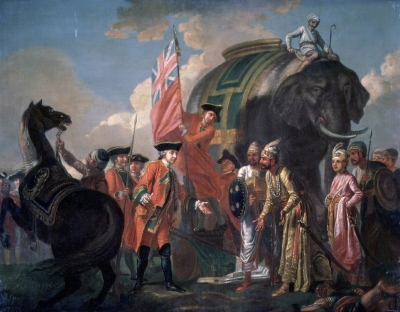
 The young Robert Clive was an uncontrollable teenager who terrorized the people of his hometown in Britain. Finally, Clive’s long-suffering father could stand no more, and the young man was packed off to India, at the age of 17, as a clerk in the East India Company in Madras. In 1746, Madras was captured by the French, and Clive and several others escaped to Fort St. George, 20 miles away. Here he joined the East India Company’s private army, and found his role in life-that of soldier, imperial statesman and politician.
The young Robert Clive was an uncontrollable teenager who terrorized the people of his hometown in Britain. Finally, Clive’s long-suffering father could stand no more, and the young man was packed off to India, at the age of 17, as a clerk in the East India Company in Madras. In 1746, Madras was captured by the French, and Clive and several others escaped to Fort St. George, 20 miles away. Here he joined the East India Company’s private army, and found his role in life-that of soldier, imperial statesman and politician.
Clive quickly began to build a reputation for courage and skill in battle in the wars against the French. With a force of just 200 Europeans and 300 native soldiers, backed up with a handful of guns, Clive took the central fort of Argot, and proceeded to hold it against all the odds. His exploits won him the name Sabut Jung, or ‘the daring in war’.
Later, Clive became Lieutenant Colonel and Deputy Governor of Fort St. David. He was involved in several key battles. One was the battle of Calcutta in February 1757.This inspired a series of victories that led to the decisive win at the Battle of Plassey-a battle that strengthened British control of India. Thus, Robert Clive had almost single-handedly secured the beginning of the British Empire, and brought about the unique mix between British and Indian cultures.

